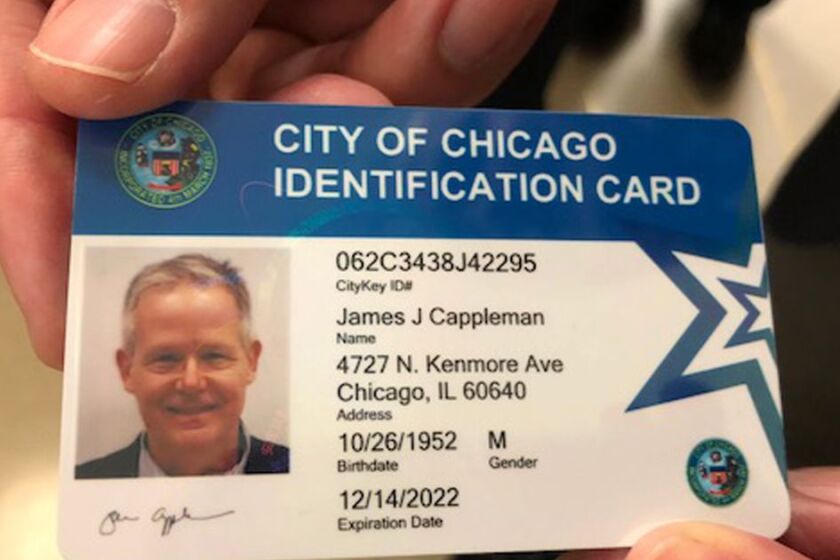Municipal ID programs offer ID to undocumented people, and ICE wants their data

Amid the ongoing collapse of democratic norms in the U.S., it is easy to miss a nightmare scenario unfolding for the digital identity industry. CBS News reports that Chicago – among cities singled out by Donald Trump in recent social media posts about mass deportations – is pausing online applications for its municipal ID program, CityKey, after receiving a subpoena for records from Immigration and Customs Enforcement, or ICE.
The notion that digital identity is a way for governments to seize control of populations has, historically, leaned paranoid, albeit not far from legitimate concerns about privacy and surveillance. But those concerns now appear to be actualizing in real time, threatening to shatter the foundation of trust needed for a successful digital ID program.
Pause to CityKey online municipal ID program mostly impacts people in need
“This was a tough decision as this program serves a number of vulnerable populations that rely on the accessibility of CityKey,” says a statement from City Clerk Anna Valencia . “Ultimately, that’s also the reason I’m pausing our online platform. Making decisions that protect people is vital during a time where the federal government is terrorizing its own people, and I’m going to keep speaking out and standing up for all Chicagoans.”
According to Valencia’s website, the Chicago CityKey is an “optional, valid, government-issued ID card offered to all Chicago residents.” It resulted from a program that looked to reduce barriers to obtaining government-issued ID for unhoused and undpcumented people, but has since grown to include discounts and other benefits for all of Chicago’s 2.7 million residents, such as serving as a library card, transit card and benefits card for businesses and events.
Valencia says people can still apply for CityKey ID in person, since no online records are retained in that process. “If you come to our in-person events, know that you can get the CityKey card, and we’re not keeping any of your records, and you can make an appointment on our website so that we can continue to get the CityKey out to all Chicago residents. And that’s really the thing is that we do not want to be intimidated or bullied.”
So far, Chicago has resisted the subpoena from ICE to gain access to applicant records. Mayor Brandon Johnson says “it’s bad” and “it’s wrong.”
Chicago Corporation Counsel Mary Richardson-Lowry says the city “respectfully declined within the bounds of the law, given the privacy issues, and specifically the exposure of groups like domestic violence victims, which would have been exposed had that information been provided.”
What is a municipal ID program?
Municipal identity programs are run by cities or towns, and often serve purposes beyond identification, providing access to services, museums and art galleries, sports facilities and more. Some are used as reward or loyalty cards for businesses, and some serve as prepaid or full-fledged debit cards. The first municipal ID was implemented in New Haven, Connecticut in 2007.
According to a study from the Windsor Law Center for Cities, communities adopt municipal ID cards to address a wide range of barriers and coordinate access to services. “For example, municipal IDs might be helpful for people who are homeless, youth exiting foster care, older adults, transgendered people, youth, people without immigration status, people who can’t afford to replace their ID, and many others. Shared among these communities is the desire for full inclusion, harm reduction, and safety for all.”
The Law Center’s report reviews municipal ID programs in New Haven, New York, and Montreal, among other North American cities. It identifies widespread use cases, outreach to businesses and acceptance by financial services as keys to success in the long term.
“Most importantly, municipal ID programs must also be designed with security and protection of private data in mind. This can be done in several ways, the most effective being reducing the amount of information gathered in the application process and disposing of personal information once it has been used.”
The report, from 2022, also flags concerns over potential data leaks to ICE as the reason for a suspension of Detroit’s municipal ID program.
NYC, Greensboro see applications from recent arrivals
Municipal IDs and immigration enforcement are connected, since the point of a municipal ID is that it provides anyone, including undocumented residents and the unhoused, a way to access their cities.
An episode of the Next City podcast looks at two seemingly different municipal ID programs: New York City’s IDNYC program, and the FaithAction ID initiative in Greensboro, North Carolina – a municipal ID program rooted in Christian religious principles. However, both programs were born out of collaboration between nonprofits, police departments and local governments, and have been replicated by other municipalities across the country.
Banks a crucial piece in getting municipal IDs to take
A blog from the Federal Reserve Bank of Kansas City asks, could municipal IDs facilitate access to financial services? It notes that “in 2023, nearly 730,000 unbanked U.S. households cited the lack of necessary personal identification (ID) required to open a financial account as a reason for being unbanked.”
“Municipal ID programs provide a form of local identification and can be designed to facilitate access to banking and financial services, though challenges to achieving this potential remain.”
One is “getting the ID into the hands of the people who need it.”
“Although a greater range of documentation is accepted as proof of identity and residency in applying for a municipal ID, not all documents are given equal weight, and therefore different combinations may be required. For some households, obtaining a municipal ID could be nearly as restrictive as obtaining a state-issued ID.”
Another challenge is getting financial institutions to accept municipal IDs – one of the Center for Cities’ keys to successful implementation.
Exclusion costs money lost along ‘unhappy path’
Ultimately, what’s at stake – in both the question of municipal IDs, and the question of immigration crackdowns – is inclusion. Who belongs where? How do we know?
A recent research report on “The Economic Impact of ID Exclusion” from Women in Identity illustrates how, when people have difficulty proving who they are, it burdens all kinds of organizations, including for-profit companies. According to the World Bank, approximately 850 million people lack official ID and 3.3 billion people do not have access to digital ID for official transactions online. Yet the cost to businesses from identity exclusion is still poorly understood.
“Whether the challenges are in sub-Saharan Africa or North America, a common theme is that it can be very hard for those without an identity to get ahead,” says a foreword by Jeremy Grant, coordinator for the Better Identity Coalition. “And with this, businesses who would like to offer a product or service often find themselves unable to do so for those without an ID – meaning that the lack of ID holds those firms back from growing their business, or in some cases, lending a helping hand to someone who is in need.”
The author of the report, Edgar Whitley, calls this the “unhappy path,” wherein even if people are able to complete the process, they are likely to incur extra costs in time and money to do so. He believes widening the “happy path” will not only make things easier for more people, but could also reduce onboarding costs to businesses and grow their customer base.
Cities pursuing municipal ID programs may be looking to widen the “happy path” and, in doing so, reduce costs associated with identity exclusion.
But the path will only remain happy as long as it does not lead to a prison in El Salvador. Trust in digital identity depends on a sense of safety in using it. If, from the get-go, digital IDs – be they municipal, state-issued, or federal – are blatantly used for mechanisms to entrench political control or forward ideological agendas, it may be a long road to mass adoption, indeed.
Article Topics
digital ID | financial inclusion | government services | identity document | identity exclusion | identity management | legal identity | municipal ID | United States








Comments